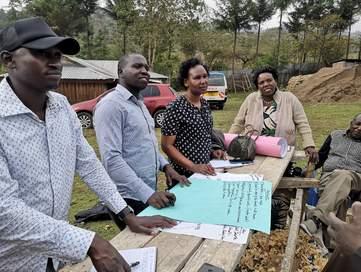






Community-based and practice-led training empowering communities to lead change



About the UCL Citizen Science Academy
What is citizen science?
Inclusion, empowerment and impact: the
Citizen Science Academy’s principles
UCL Citizen Science Certificate
Case study - PROCOL UK
Case study - PROCOL Lebanon
Case study - PROCOL Africa - Tanzania
Case study - PROCOL Africa - Kenya
Who we work with Contact us

The UCL Citizen Science Academy is an initiative to deliver community-based, practice-led research training to empower communities to lead change through social action and shaping policies that impact their livelihoods.
The Academy is based at the Institute for Global Prosperity (IGP) at UCL and has been designed to make participation in research inclusive and accessible to people from all backgrounds.
The high-quality training programmes equip people with research knowledge and practical skills to get involved in local decision-making.
All our training programmes are linked to active realworld research projects and are delivered in nonacademic, community-based settings.
We partner with voluntary sector organisations to recruit, employ and support our citizen scientists in all aspects of their work. Academy citizen scientists do not need any prior experience of research, work, or study in further or higher education.
The UCL Citizen Science Academy is part of the University’s goal to build a sustainable and scalable infrastructure to support education, training, and recognition for citizen science outside higher education institutions.


Rigorous, high-quality education and training programmes are ‘applied’, meaning they are linked to active research projects, and are delivered in non-academic, community-based settings. Citizen scientists join a training programme in research methods which involves:
Practice-based workshops
Qualitative data collection including in-depth interviews, focus groups, walking ethnography and photo-elicitation interviews
Analysis and presentation of the research
Writing up and producing interview-based stories
The Academy training programme are designed to make sure that people from all backgrounds and abilities can access and achieve the Certificate. The practical tasks and exercises reflect this commitment to inclusive teaching practices.
Citizen scientists on Academy training programmes are employed and paid while they are learning and carrying out research.
No prior experience of research, work, or study required.
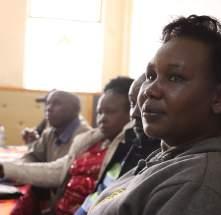



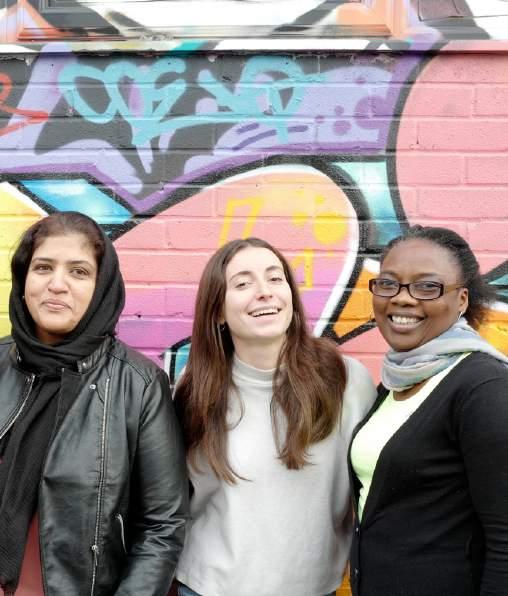
Prosperity in east London 2021-2031 is a 10-year mixedmethods study tracing the effects of large-scale and long-term urban regeneration on local communities in east London. It is the first longitudinal study in the UK to track household prosperity - using IGP’s citizen-led Prosperity Index and is based on qualitative research about the determinants of prosperity for individuals and communities. The study equips local residents with the tools to examine prosperity in their communities, producing citizen-centred insights on people’s lived experiences of regeneration.
Managed by the IGP Prosperity Co-laboratory UK (PROCOL UK) in partnership with the UCL Centre for Longitudinal Studies, the study was co-designed with members of the London Prosperity Board – a cross-sector partnership between the IGP, UCL East London government, public agencies, businesses, the sector, and local communities in east London, to chang way decision-makers think and act for prosperity.
Partners
London Prosperity Board, Compost London, Leaders in the Community, Hackney Quest, and UCL Centre for Longitudinal Studies
The study aims to fill the gap in research regarding the unequal impacts of regeneration on prosperity, life chances, and quality of life amongst local communities in the long-term. The research looks at how regeneration affects the prosperity of people from different backgrounds and neighbourhoods, asking:
Who benefits and how?
What are the obstacles to prosperity for different groups?



The citizen social scientists participated in a 3-month structured employment and research training programme conducted by UCL’s Citizen Science Academy.
The first wave of the qualitative research took place between September and October 2021. Ten residents from east London were employed and supported by community organisations Compost CIC, Hackney Quest, and Leaders in the Community. Citizen social scientists were employed and paid on a part-time basis.
The posts were publicly advertised, with no prior research experience required, and preference was given to individuals who had lived in the sites for over 5 years.
The citizen social scientists learned and carried out photo-elicitation interviews, observation and walking ethnography, analysis, research for impact and public speaking. They were taught the following methods and had opportunities to practice each of these:
Photography: Photo-Elicitation Interviews (PEI)
Observation methods: A x 4 – Actors, Artifacts, Activities, Atmosphere
Interview Skills: Focus groups, individual interviews, active listening
Analysis methods: Open coding, axial coding, selective coding
Complex systems: Addressing wicked problems
Public speaking methods: The art of storytelling
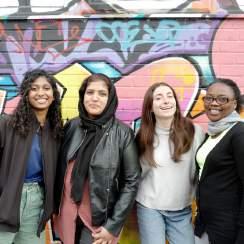
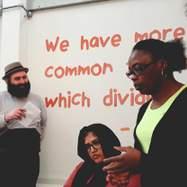
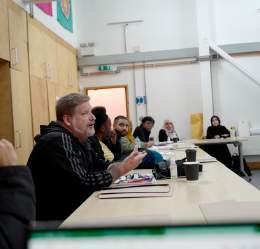
Prosperity in east London 2021-2031 is a mixed methods study that combines data from the “Obstacles to Prosperity citizenled qualitative research” and the “Citizen Prosperity Index household survey” . Data will be collected in three waves between 2021 and 2031.
Each wave will include a survey of over 4,000 households examining how people self-report their experiences and perceptions of prosperity, as well as in-depth interviews and group discussions focusing on understanding obstacles to prosperity for people from different backgrounds.
During the first wave the citizen social scientists carried out interviews, focus groups, walking ethnographies and generated video, audio, and visual outputs, which they analysed. In total, the citizen social scientists conducted close to 30 interviews and collected over 500 images, reaching out to approximately 40 community members through their research.
Zines: short visual and textual publications (mini magazines) that weave together the qualitative research each citizen social scientist has conducted, highlighting key themes and messages on lived experiences of prosperity in their research
Walking tours: citizen social scientists have led policymakers, developers, and local council partners on various tours of their research sites. Example: Citizen Scientists-led walking tour of Gascoyne Estate, Hackney Wick & Fish Island
Presentations: to policymakers, academics, and community organisations. Example: Terry and Twinkle’s presentation at the Olympic Legacy Conference 2022
In 2023/24, the stories will be analysed to develop new thinking about pathways to prosperity for local communities.

PROCOL Lebanon is an innovative research collaboration that works to speed up transitions to sustainable, prosperous societies in the context of mass displacement. It is about the prosperity of Lebanon in particular, but is also part of a larger agenda for developing sustainable ways to improve the quality of life of people throughout the world.
PROCOL Lebanon brings Lebanese and UK institutions and expertise together using cutting-edge research and innovation. Its research focuses on the themes of prosperity, the vital city, green futures, future education, and creating value. So far, PROCOL Lebanon has developed Prosperity indices for Hamra (Beirut) and Mina (Tripoli), a Vulnerability Index for Mar Mikhael (Beirut), and Quality of Livelihoods datasets for Ras Beirut and Mina.
PROCOL Lebanon’s data on prosperity, vulnerability and is used to catalyse positive social change through citizeninterventions in the community, policy change, capacity building and education.
Partner organizations include educational institutions, NGOs, municipal bodies, academic and activist initiatives, artistic collectives, and individual initiatives.
Hamra and Ras Beirut are the most diverse sites in terms of social and economic diversity. They also host our main partners, the American University of Beirut and Centre for Lebanese Studies.
In Bourj Al Barajneh (refugee camp), Ouzai and Bar Elias, the research looked specifically at refugees' socio and spatial practices.
Karantina and Mar Mikhael were chosen as a result of the Beirut blast and our need to contribute to the response in the reconstruction and rehabilitation phase.




Aside from the Syrian war that displaced 1.5 million refugees into Lebanon (a third of the size of its own population), the country has experienced long-term sectarian conflicts and regional instability.
How can we understand prosperity in a context of crisis and conflict?
What does prosperity look like when infrastructure and public services are under extreme pressures?
How can we measure prosperity when livelihood insecurity and informal employment are significant features of everyday life?
How can we design local initiatives that can drive social change at other scales?
The citizen social scientists were recruited in consultation with local partners. They were selected based on their knowledge of and interest in conducting research in their community.
Socio-economic and educational diversity was a key factor in the overall group recruitment configuration. They learned and carried out quantitative data collection (building survey, infrastructure survey, open spaces survey, household survey, Discrete Choice Experiments), interviews, focus group discussion, ethnographies, and proposal writing.
The research methods were taught in half-day or full-day training sessions. Training sessions included seminars led by the PROCOL Lebanon team and local partners based in Lebanon, as well as supervised practical trials among citizen social scientists and on field.


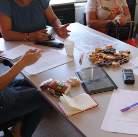
The citizen social scientists conducted semi structured interviews with local stakeholders, carried out focus groups and collected household data on various themes relating to prosperity, and collected quantitative data about buildings, infrastructure, and open space.
The data was analysed by the PROCOL Lebanon and Citizen Scientists who had interests in GIS mapping and report writing.
Reports: Hamra Neighbourhood profile
Mina prosperity report
Assessing vulnerabilities for urban recovery solutions in post-explosion Beirut report
Working papers:
Lives and livelihoods in turbulent times working paper series
Ethnographies in Hamra and Ras Beirut
Citizen social scientists’ artworks for conferences and refugee week
Urban Interventions:
Bar Elias participatory spatial intervention
Karantina participatory spatial interventions
Social Interventions:
Goods of Our City Urban Garden
Jouwan Community Center
Wirach Platform
Mayyel Community Initiative

The first part of the research involved 24 focus groups with residents in the three settlements, and interviews with local stakeholders. The citizen science team analysed the findings and developed a ‘maisha bora model’ to visualise community priorities. The research findings and model were presented to community members in a series of feedback workshops before being translated into new indicators to measure prosperity for settlement residents.
The second part of the research involved surveying over 1,000 households in the three settlements.The initial results of the household survey were presented at events with academic and policy researchers, and community members, NGOs, and ward and municipal officials in Dar es Salaam in April 2022. IGP and CCI statistical analysts are currently working on the Maisha Bora Index – Africa’s first citizen-led prosperity measures – which will be launched later in 2023.
The team have developed a range of outputs including:
The ‘maisha bora model’ representing what supports a good life for residents in unplanned settlements
A household survey that can be replicated in other unplanned settlements in Tanzania
Training materials
Research findings that have been published in the academic journal Urban Planning, and translated into Swahili and published in a working paper.

Agriculture in Kenya is dominated by smallholder farmers who produce much marketed agricultural produce. Farmers sell their produce to consumers directly or to processors via middlemen (ie. traders, transporters, aggregators).
The goal of the research is to map existing agrifood value chains across Mau-Cherangani complex to identify opportunities for improved livelihoods for smallholder farmers. Integrating farmers into value chains will improve their access to markets, improve livelihoods, and access to nutritious food.
The British Institute of Eastern Africa (BIEA), University of Eldoret (UoE), University of Nairobi, and the Counties of Narok, Bomet, Kericho, Nandi, Elgeyo Marakwet, Uasin Gishu.
In line with the overarching objective of this study to map agrifood value chains in MauCherangani complex, we asked:
How are smallholder farmers connected to value chains?
What are the livelihood challenges for smallholder farmers, especially women, and how can they be overcome?



The team have developed a range of outputs including:
Reports: Summary of value chains (dairy, maize, poultry, coffee, tea, sheep, beef, potato, honey and avocado) that also show social networks between value chain actors
Publications: The results will be prepared and submitted to scientific journals. In addition, a number of blog posts will be prepared from the collected and analysed data
Poster: The results of the nutrition photovoice data will be presented as a poster at the Agriculture, Nutrition & Health Academy week ANH, in Lilongwe Malawi
Working paper: Drivers of agricultural production and participation in agrifood value chains


